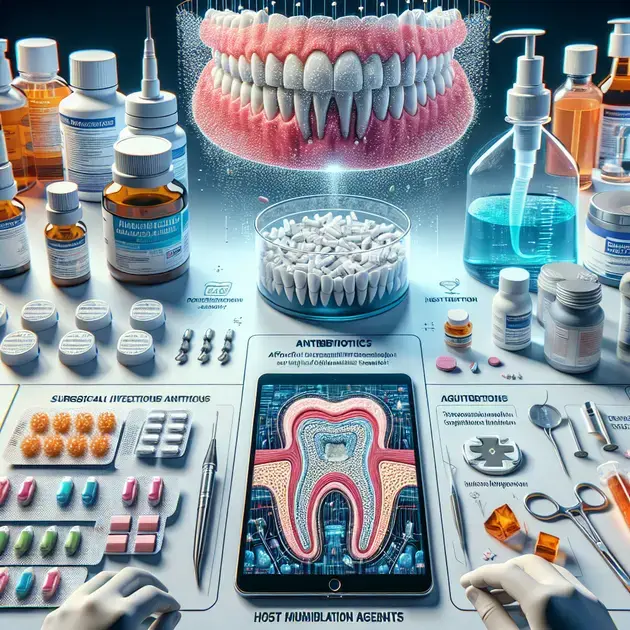When it comes to tackling periodontitis, finding the right medication is crucial for effective treatment. In this comprehensive guide, we will explore the most up-to-date and proven strategies for combating this common dental issue.
Periodontitis, a severe gum infection that damages the soft tissue and destroys the bone that supports your teeth, requires a targeted approach for successful management. This guide will cover the most effective medication options available to help you regain your oral health with confidence.

Effective Medication Options for Periodontitis
Periodontitis is a serious gum infection that damages the soft tissue and destroys the bone that supports your teeth. It requires effective medication options to control the infection and prevent further damage. Here are some medications commonly used for treating periodontitis:
1. Antibiotics
Antibiotics are often prescribed to combat the bacteria causing the gum infection. They can be in the form of pills, mouth rinses, or gels. Common antibiotics used for periodontitis include doxycycline and metronidazole. These medications help reduce inflammation and control the infection.
2. Antiseptic Mouthwashes
Antiseptic mouthwashes containing chlorhexidine or essential oils can help reduce the amount of bacteria in your mouth, promoting healing of the gums. These mouthwashes are usually used in conjunction with regular brushing and flossing.
3. Enzyme Suppressants
Enzyme suppressants like sub-antimicrobial dose doxycycline (SDD) help inhibit the enzymes that break down the gum tissue. By reducing these enzymes, the progression of periodontitis can be slowed down, allowing the gums to heal.
4. Prescription-strength Toothpaste
Prescription-strength toothpaste containing special ingredients like fluoride and triclosan can help control the bacteria in your mouth and prevent plaque buildup. Regular use of this toothpaste can support your periodontal treatment.
5. Pain Medication
In cases of advanced periodontitis where there is significant pain and discomfort, pain medication such as ibuprofen or acetaminophen may be prescribed to manage the symptoms. Pain relief can help patients undergoing periodontal treatment feel more comfortable.
When it comes to treating periodontitis, a combination of medications and good oral hygiene practices is essential for effective management. Consult with your dentist or periodontist to determine the best medication options for your specific condition.
Understanding the Importance of Medication for Periodontitis
Medication plays a crucial role in the treatment of periodontitis, a common yet serious gum infection. Understanding why medication is important for managing periodontitis can help patients better adhere to their treatment regimens and achieve optimal oral health outcomes.
1. Controlling Bacterial Infections
Medication, such as antibiotics and antiseptic mouthwashes, is essential for controlling the bacterial infections that cause periodontitis. These medications target the bacteria in the mouth, reducing inflammation and preventing further damage to the gums and supporting structures of the teeth.
2. Supporting Healing and Tissue Regeneration
Some medications, such as enzyme suppressants and prescription-strength toothpaste, help support the healing process and promote tissue regeneration in the gums. By targeting specific enzymes or providing essential nutrients, these medications contribute to the repair of the damaged gum tissue.
3. Managing Symptoms and Discomfort
Pain medication may be necessary in cases of advanced periodontitis to help patients manage the symptoms and discomfort associated with the infection. By alleviating pain, medication can improve the quality of life for individuals undergoing periodontal treatment.
4. Preventing Disease Progression
Medication not only treats the existing infection but also helps prevent the progression of periodontitis. By controlling the bacteria and inflammation in the mouth, medications can slow down the advancement of the disease and preserve the health of the gums and teeth.
5. Enhancing Treatment Outcomes
By following the prescribed medication regimen and maintaining good oral hygiene practices, patients can enhance the outcomes of their periodontal treatment. Medication complements professional dental care and at-home oral care routines, leading to improved overall oral health.
Overall, medication is a critical component of periodontal treatment, playing a vital role in controlling infections, supporting healing, managing symptoms, preventing disease progression, and enhancing treatment outcomes. Patients with periodontitis should work closely with their dental healthcare providers to develop a comprehensive treatment plan that includes appropriate medications.
Tips for Choosing the Best Medication for Periodontitis
When selecting medication for the treatment of periodontitis, it’s important to consider various factors to ensure you are choosing the most effective options for your specific condition. Here are some tips to help you choose the best medication for periodontitis:
1. Consult with a Dental Professional
Before starting any medication for periodontitis, consult with your dentist or periodontist. They can evaluate your oral health status, determine the severity of your gum infection, and recommend the most appropriate medications for your individual needs.
2. Consider the Type of Medication
There are different types of medications used to treat periodontitis, including antibiotics, antiseptic mouthwashes, enzyme suppressants, and prescription-strength toothpaste. Depending on the stage and progression of your gum disease, your dental provider may recommend a combination of these medications.
3. Evaluate Potential Side Effects
Before starting any medication, be sure to discuss potential side effects with your dental professional. Some medications used for periodontitis may have side effects such as GI upset, discoloration of teeth, or allergic reactions. Understanding these side effects can help you make an informed decision.
4. Follow the Prescribed Regimen
It’s crucial to follow the prescribed medication regimen provided by your dental provider. Consistency in taking the medication as directed and following the recommended dosage instructions is essential for achieving optimal treatment outcomes and controlling the gum infection.
5. Maintain Good Oral Hygiene Practices
In conjunction with medication, maintaining good oral hygiene practices is key to managing periodontitis. Brushing twice a day, flossing daily, and using an antiseptic mouthwash can help control bacteria in the mouth and support the effectiveness of the medication in treating the gum infection.
By following these tips and working closely with your dental healthcare team, you can choose the best medication for periodontitis and enhance the success of your treatment. Remember that proper medication selection and adherence, combined with a proactive approach to oral care, are essential for effectively managing periodontal disease.

Understanding the Role of Medication in Periodontitis Management
Periodontitis is a chronic inflammatory disease that affects the supporting structures of the teeth, including the gums and bone. While professional dental cleanings and good oral hygiene practices are essential for managing periodontitis, medication can also play a crucial role in treatment. Medications for periodontitis are typically prescribed to control infection, reduce inflammation, and promote healing.
One common type of medication used in periodontitis management is antibiotics. Antibiotics can help eliminate the bacteria causing the infection and prevent its recurrence. They are often prescribed in conjunction with scaling and root planing, a deep cleaning procedure that removes plaque and tartar from below the gumline.
In addition to antibiotics, antimicrobial mouth rinses may also be recommended to help reduce plaque and prevent the growth of bacteria in the mouth. These mouth rinses can be used as an adjunct to daily brushing and flossing to improve oral hygiene and reduce the risk of recurrent infections.
Another type of medication that may be prescribed for periodontitis is host modulation agents. These medications target the body’s response to infection and inflammation, helping to reduce the destructive immune response that can contribute to tissue damage in the gums and bone. By modulating the host response, these medications can help slow the progression of periodontitis and support the healing process.
In conclusion, medication can play a valuable role in the management of periodontitis by controlling infection, reducing inflammation, and promoting healing. When used in conjunction with professional dental care and good oral hygiene practices, medications for periodontitis can help improve treatment outcomes and support long-term oral health.
Maximizing the Benefits of Medication for Periodontitis Treatment
When it comes to treating periodontitis, medication can offer a range of benefits that can help improve treatment outcomes and support long-term oral health. By understanding how to maximize the benefits of medication, patients can optimize their treatment plan and achieve better results.
One key benefit of medication for periodontitis treatment is its ability to target the underlying cause of the disease. By addressing the bacterial infection and inflammation that contribute to periodontitis, medications can help control the progression of the disease and prevent complications.
Furthermore, medications for periodontitis can also help reduce the need for surgical interventions in some cases. By effectively managing the infection and inflammation with medication, patients may be able to avoid or delay the need for more invasive treatments, such as gum surgery or bone grafting.
Additionally, medication can be used to support the results of professional dental cleanings and other periodontal treatments. By using medications as prescribed by a dental professional, patients can maintain the benefits of treatment between appointments and help prevent the recurrence of periodontitis.
Overall, by maximizing the benefits of medication for periodontitis treatment, patients can improve their oral health, reduce the risk of complications, and support the long-term success of their treatment plan. Working closely with a dental professional to develop a personalized medication regimen can help patients achieve optimal outcomes in managing periodontitis.
Navigating the Options: Choosing the Right Medication for Periodontitis
With a variety of medications available for the treatment of periodontitis, choosing the right one can be a key decision in effectively managing the disease. By understanding the options and factors to consider when selecting medication for periodontitis, patients can make informed choices that align with their treatment goals and preferences.
One factor to consider when choosing medication for periodontitis is the severity of the disease. In cases of mild to moderate periodontitis, antimicrobial mouth rinses and topical antibiotics may be sufficient to control the infection and inflammation. In more advanced cases, systemic antibiotics or host modulation agents may be necessary to achieve optimal results.
Another consideration is the patient’s medical history and any existing health conditions. Some medications used to treat periodontitis may interact with other medications or exacerbate certain health conditions. It is important for patients to disclose all medications and medical history to their dental provider to ensure safe and effective treatment.
Cost can also be a factor when choosing medication for periodontitis. Some medications may be more expensive than others, and insurance coverage can vary. Patients should discuss the cost of medications with their dental provider and explore any available financial assistance or alternative options to ensure access to necessary treatment.
Ultimately, the right medication for periodontitis will depend on individual factors such as disease severity, medical history, cost, and personal preferences. By working closely with a dental professional to discuss these factors and weigh the options, patients can make informed decisions about their medication regimen and optimize their treatment outcomes.
Conclusion
Medication plays a crucial role in managing periodontitis, complementing professional dental care and good oral hygiene practices. Antibiotics, antimicrobial mouth rinses, and host modulation agents are key medications used to control infection, reduce inflammation, and promote healing in periodontitis management.
By maximizing the benefits of medication, patients can target the underlying causes of periodontitis, preventing complications and the need for surgical interventions. This optimization allows for better treatment outcomes, supporting long-term oral health and reducing the risk of recurring infections.
When choosing the right medication for periodontitis, factors such as disease severity, medical history, and cost need to be considered. Collaborating closely with a dental professional is essential to develop a personalized medication regimen that aligns with treatment goals and preferences, ultimately optimizing the success of managing periodontitis.



